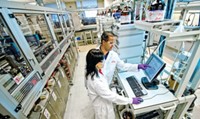Advertisement
Grab your lab coat. Let's get started
Welcome!
Welcome!
Create an account below to get 6 C&EN articles per month, receive newsletters and more - all free.
It seems this is your first time logging in online. Please enter the following information to continue.
As an ACS member you automatically get access to this site. All we need is few more details to create your reading experience.
Not you? Sign in with a different account.
Not you? Sign in with a different account.
ERROR 1
ERROR 1
ERROR 2
ERROR 2
ERROR 2
ERROR 2
ERROR 2
Password and Confirm password must match.
If you have an ACS member number, please enter it here so we can link this account to your membership. (optional)
ERROR 2
ACS values your privacy. By submitting your information, you are gaining access to C&EN and subscribing to our weekly newsletter. We use the information you provide to make your reading experience better, and we will never sell your data to third party members.
Policy
Obama Backs R&D Tax Credit
Economy: Plan would increase and make permanent a research tax break
by Glenn Hess
September 13, 2010
| A version of this story appeared in
Volume 88, Issue 37
President Barack Obama is calling on Congress to expand and permanently extend the research and development tax credit for U.S. businesses as part of a multi-billion-dollar package intended to stimulate the nation’s sluggish economy.
In a speech in Cleveland last week, Obama urged lawmakers to make permanent an R&D tax credit that has lapsed 13 times since it was created in 1981. The credit, which encourages companies to develop new technologies domestically and preserve American jobs, expired most recently at the end of 2009.
Although the tax break enjoys bipartisan support in Congress, coming up with ways to pay for its high cost has been a stumbling block. The expanded credit proposed by the White House would be worth an estimated $100 billion over the next decade.
The benefit will “go to companies for all the research and development they do right here in America,” Obama said. His plan would make the tax credit more generous for companies that use a simplified formula, raising it to 17% of R&D spending, up from 14%.
An expanded and permanent R&D tax credit would contribute to job growth in the chemical manufacturing sector, says Lawrence D. Sloan, president of the Society of Chemical Manufacturers & Affiliates, an industry trade association.
“This tax credit makes it easier for small and mid-sized batch, custom, and specialty chemical manufacturers to manage their research budgets and make effective business decisions,” Sloan says.
He notes that 70% of credit dollars are used for salaries of workers engaged in R&D activities. “Given the slow pace of the economic recovery, we hope lawmakers will act quickly to make this extension permanent,” Sloan remarks.
Obama said he would pay for the R&D credit by asking Congress to end other “tax breaks that encourage companies to create jobs and profits in other countries.”
But Sloan warns that Congress should not make taxing the profits of multinational corporations a condition of extending the research tax credit. “We recognize the importance of a pay-as-you-go system, but manufacturers with overseas operations should not be penalized because of the profits they make,” he says.







Join the conversation
Contact the reporter
Submit a Letter to the Editor for publication
Engage with us on Twitter